Band on the Run
Band on the Run
A History of
Paul McCartney and Wings
Garry McGee

First Taylor Trade Publishing edition 2003
This Taylor Trade Publishing softcover edition of Band on the Run is an original publication. It is published by arrangement with the author.
Copyright 2003 by Garry McGee
Advertisements: courtesy the McMarr collection
Photographs: courtesy PJ! Archives
Sheet music: courtesy Marald/Geran
Records and collectibles: courtesy the GCMII collection; LJM ltd.
Every effort has been made to trace the ownership of all copyrighted material and to secure permission from copyright holders. In the event of any questions arising as to the use of any material, we will be pleased to make necessary corrections in future pressings.
All rights reserved.
No part of this book may be reproduced in any form or by any electronic or mechanical means, including information storage and retrieval systems, without written permission
Published by Taylor Trade Publishing
An Imprint of Rowman & Littlefield Publishing Group
200 Park Avenue South, Suite 1109
New York, New York 10003
Distributed by National Book Network
Library of Congress Cataloging-in-Publication Data
McGee, Garry, 1966
Band on the run : a history of Paul McCartney and Wings / Garry
McGee.1st Taylor Trade Pub. ed.
p. cm.
Includes bibliographical references and index.
Discography: p.
ISBN: 978-0-87833-304-2
1. McCartney, Paul. 2. Rock musiciansEnglandBiography. 3. Wings
(Musical group) I. Title.
ML410.M115 M3 2003
782.42166'092'2dc21
2002151274
 The paper used in this publication meets the minimum requirements of American National Standard for Information SciencesPermanence of Paper for Printed Library Materials, ANSI/NISO Z39.481992. Manufactured in the United States of America.
The paper used in this publication meets the minimum requirements of American National Standard for Information SciencesPermanence of Paper for Printed Library Materials, ANSI/NISO Z39.481992. Manufactured in the United States of America.
Contents
.
Acknowledgments
A book is the work of not one person, but many people: Henry McCullough for sharing his recollections of Wings; Michael Dorr, Ross Plotkin, and the staff at Taylor Trade Publishing for their work and efforts in publishing this book; Nigel Martyn for his connections; Jean Larson, Kathy Martin, Joan Kufrin, and Rosemarie Larson for their suggestions, research, and comments to persevere. A special thank you goes to my parents, family, and friends for their much help and confidence while I was writing this book; and to everyone else who either supported me or the work, I thank all of you. And, of course, thank you to all the members of Wings for the music...
I think, looking at (Wings) overall, I dont regret it and I dont think it was that much of a mess. My feeling all the time was hanging in there rather than doing very well. But look at ittheres Mull of Kintyre, the biggest record ever in Britain since the gramophone. So thats not bad if youre looking for that kind of thing. Then theres stuff like Juniors Farm and then sorta stuff like My Love. When I break it down like that, I really dont think it was a mess. But in my mind I was going through a bit of a mess.
PAUL MCCARTNEY, 2001
Prologue
On April 9, 1970, Paul McCartney announced that he was leaving the most successful musical group of the rock and roll era. In the previous six years, the BeatlesPaul McCartney, John Lennon, George Harrison, and Ringo Starrhelped change the face of popular music and were an undeniable force in the turbulent 1960s. But now the end had come, and Mr. McCartney was declaring his independence. The Beatles had grown upand apart.
Fans were shocked and angered. Many blamed the Beatles wives for the breakup. Lennon had married Yoko Ono on March 20, 1969; eight days earlier, McCartney had wed Linda Eastman. (Harrison had married a few years earlier, as had Starr.) Both Linda and Yoko came from wealthy families and were strong, independent women. Both were divorcees and mothers before entering the Beatles circle. Fans believed that Linda and Yoko had swayed their respective husbands away from each other, urging them to branch out on their own as solo artists.
At the time, the public did not entirely understand the tremendous personal pressures and legal hassles the Beatles had been involved in, primarily with their company, Apple. The group was not seeing nearly the amount of money they were earning, as much of it was tied up with the company. Apple was also in mismanagement, with petty thefts and inadequate bookkeeping that furthered the existing problems among the band.
In addition, the Beatles longtime manager, Brian Epstein, had died of an accidental drug overdose in 1967. The group decided to manage themselves and had formed Apple in 1968. Almost immediately, it became all too clear that they still needed a manager. In early 1969, Lennon, Harrison, and Starr wanted to sign Allen Klein to represent the group. Klein had represented the Rolling Stones, Hermans Hermits, and the Dave Clark Five. At first, Paul agreed to this; however, after looking into Kleins background and questionable business practices, he changed his mind. Linda suggested her father and brothers business, Eastman and Eastman, to sort out the Beatles financial difficulties. Paul contacted Lee Eastman, and the firm became Apples legal advisors and acting managers on February 4, 1969. But the firm headed Apple for only a month. The other three Beatles still wanted Allen Klein, and they, without Paul, signed with him. The trio, however, agreed to keep Eastman and Eastman on as legal advisors.
Rolling Stone called Klein the embodiment of much thats wrong with old-style American business. So great was the magazines dislike of the Beatles association with Klein, it printed an editorial about the announcement. We have come to expect innovation, new perspectives, and honestyespecially honestyfrom the Beatles and especially John, and this is what made (Kleins) signing so shocking.
Paul absolutely did not want any involvement with Allen Klein. His only recourse was to remove himself from the group. Under the advice of the Eastmans, Paul sued the other Beatles in order to clear his ties to Apple and Klein. This act allowed Paul to be a free agent and choose his own manager and enabled him to have better control of his earnings and where the money was being spent, and finally allowed him to gain artistic control of his work. John Lennon had threatened to quit the Beatles several times, George had contemplated moving on, and Ringo had once left the group for a week before returning. But in the end, it was Paul who made it official.
But his doing so meant the end of the Beatles as a group, and for a while as personal friends as well. No one knew at the time, however, that the lawsuit would also mean a loss of reputation for Paul, whose solo work at times rivaled and even surpassed his success with the Beatles. Fans eventually accepted Paul and his music in the 1970s, but the press was harsher and less forgiving.
The lawsuit also meant a decades worth of legal entanglements with Allen Klein and almost twenty years of additional record company and royalty litigation before everything was finally sorted out. And out of the ashes of the most successful band of the 1960s arose one of the most successful bands of the 1970s. It was a group that accomplished almost as much as the Beatles had, from gold records and Grammy Awards to sold-out concerts and successes on the music charts.
Wings won a legion of new fans, including some who never knew its leader had been in another group.
Next page

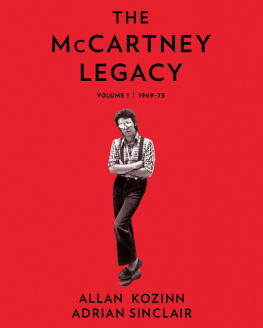
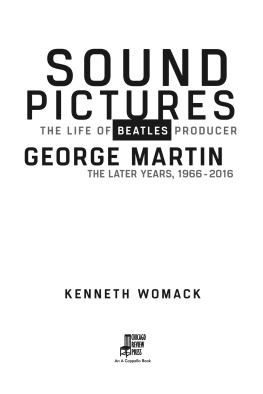

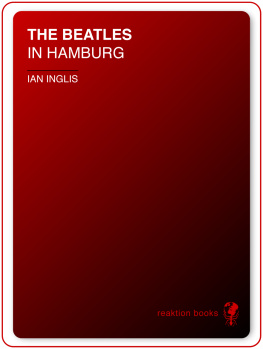
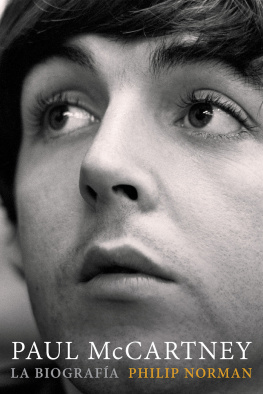
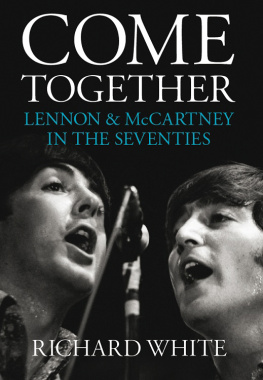
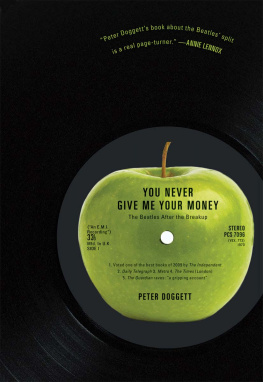

 The paper used in this publication meets the minimum requirements of American National Standard for Information SciencesPermanence of Paper for Printed Library Materials, ANSI/NISO Z39.481992. Manufactured in the United States of America.
The paper used in this publication meets the minimum requirements of American National Standard for Information SciencesPermanence of Paper for Printed Library Materials, ANSI/NISO Z39.481992. Manufactured in the United States of America.